STUDY GUIDE FOR EXAM #2
STUDY GUIDE FOR EXAM #3 (FINAL EXAM)
The following study guide should provide you with a fairly comprehensive overview of what to focus on for the exam. Note, however, that this is not a comprehensive or exclusive study guide. Anything that appeared in the lectures is fair game on the exam. This will help guide your studying but cannot replace your review of the lecture handouts and your own notes.
The exam will cover material presented in lecture. Material presented in the textbook but NOT in lecture will not be covered on the examination. However, the background reading may help you understand, or reinforce your understanding of lecture material.
The second is exam IS NOT cumulative. It will cover material covered since October 11th. Note that while the specific material covered on the first exam will not be covered here, general knowledge is cumulative and material covered through this course builds on what was covered earlier. So do not simply discard the knowledge that you have already gained.
Mutation
- Understand that mutation is the ultimate source of genetic variation and understand the mechanisms of mutation. This will require you to review some genetics from earlier in the course.
- Genetics review:
- Understand what the genome is and how it's organized in chromosomes. Note that the genome is made up of protein-coding regions, regulatory regions, and regions of no known function (sometimes referred to as junk DNA).
- For protein-coding regions, understand how one goes from DNA to mRNA via transcription to protein via translation.
- For translation, recognize that each of the 20 amino acids are coded by a string of 3 bases in the mRNA. The 3rd codon position is often (but not always) free to vary.
- Understand what nonsynonymous and synonymous mutations are.
- Be able to contrast different types of mutations: point mutations/substitutions, deletions, duplications, inversions, insertions.
The Modern Synthesis
- Understand how this was a fusion of Darwin's & Mendel's ideas and how the focus of evolutionary biology shifted.
- Understand what is meant by a population, a gene pool, the allele frequency, a fixed allele.
- Evolution (especially microevolution): The change in allele frequency in a population over time.
- This can be studied and quantified using Hardy-Weinberg Equilibrium.
Hardy-Weinberg Equilibrium
- "The frequency of alleles in a population's gene pool will remain constant over generations unless acted upon by agents other than sexual recombination."
- Understand how to calculate genotype and allele frequencies. If given the numbers, you SHOULD be able to do this from empirical frequencies.
- You should then be able to estimate what the expected allelic frequencies are from observed phenotypic/genotypic frequencies. REVIEW YOUR ANSWERS AND FEEDBACK FROM PROBLEM SET 2 IF YOU ARE CONVUSED.
- For calculating allele frequencies, understand that once you know the frequency of the recessive homozygotes, you can calculate everything.
- Understand the application of a chi-square test to observed versus expected phenotypic frequencies. Understand what the P-value refers to in this application. You do not need to memorize the formula for the Chi-square distribution.
- Know the conditions for Hardy-Weinberg equilibrium AND their violations:
- Large population size
- No migration
- No mutation
- Random mating
- Random survivorship
- Know that the result of violation of these assumptions is evolution.
Violation 1: Small population sizes causing Genetic Drift
- Understand how sampling error (e.g. random effects) can have a big effect in small populations. Genetic Drift leads to the random loss of phenotypes. Understand how this graph represents the random Genetic Drift of allele frequencies to fixation:
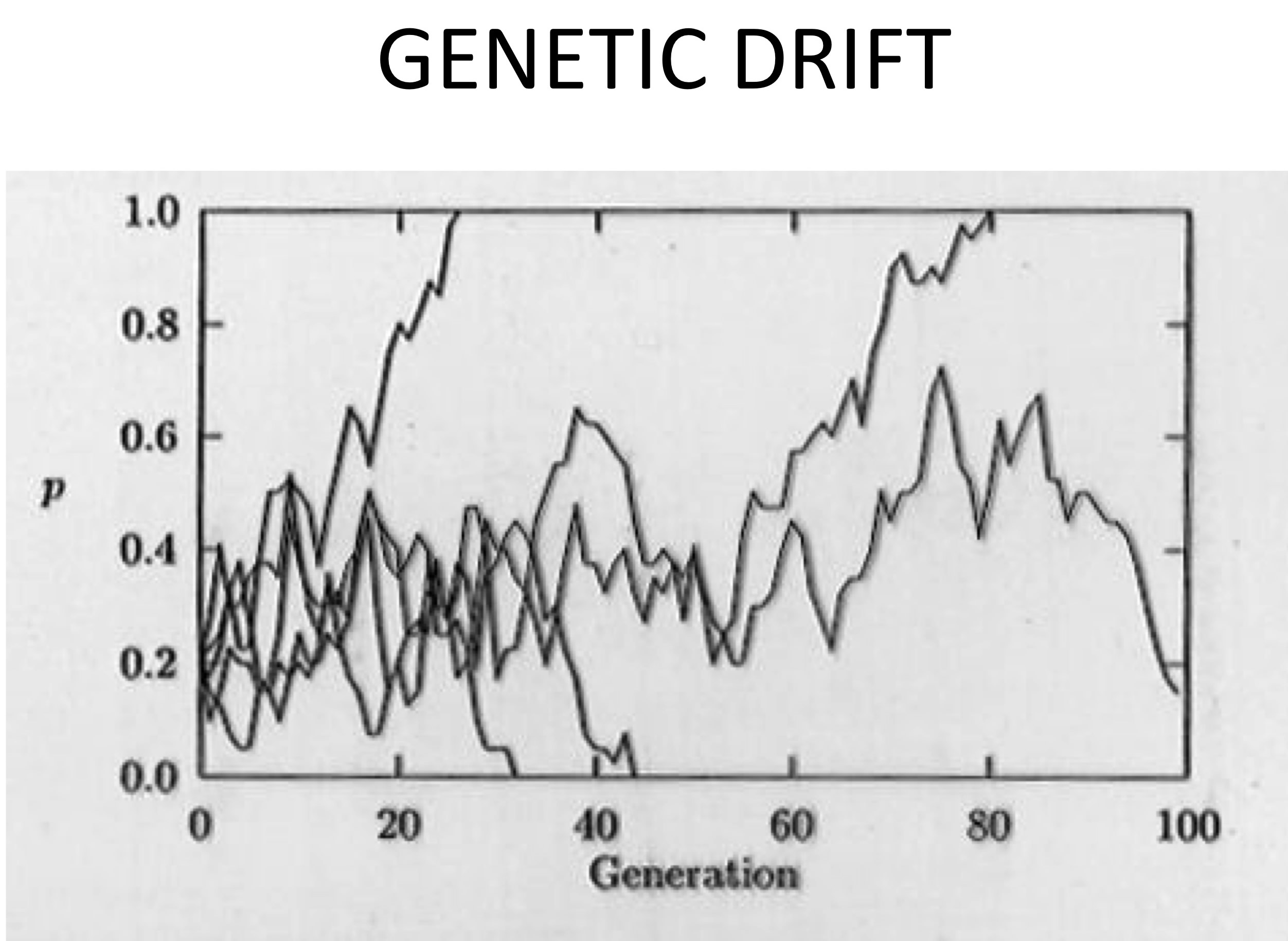
- Understand that genetic drift causes the loss of alleles throughout the genome (not just at a single locus) and can result in a bottleneck effect for populations that have gone through very small population sizes.
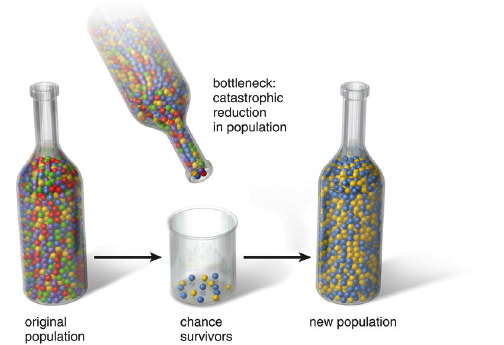
- Understand the case study of Achromatopsia on Pingelap.
- Understand how the effects of Genetic Drift result in forced inbreeding and why inbreeding is bad.
- Recognize how Genetic Drift is an important problem for understanding the health effects of inbreeding, animal husbandry, and its application to conservation biology.

- Understand that because Genetic Drift is due to the random loss of alleles that it will cause isolated populations to drift apart genetically--that is they will become more and more genetically differentiated simply through random effects.
Violation 2: Migration
- Migration: the loss or gain of alleles in a population due to migration of fertile individuals that subsequently breed.
- Understand that migration counters the effects of Genetic Drift through the recovery of lost alleles. Also understand that migration causes populations to become more genetically similar (homogeneous). How does this compare with what happens with Genetic Drift?

- Understand the application of migration management strategies to conservation decisions.
Violation 3: Mutation
- Mutation converts one allele to another allele. It is the ultimate source of genetic variation and creates new alleles.
- Understand that mutation rates are generally low.
- However, understand that very large populations can accumulate a very large amount of new genetic variation through mutation alone.
- Note that through rare mutation, large population sizes, and the amplification of variation through sexual recombination that moderately sized populations can be thought of as essentially having a near infinite variety of genetically unique individuals.
Violation 4: Non-Random Mating
- Assortative mating: individuals choose to mate with partners that are genetically similar. Decreases heterozygosity. But does not eliminate alleles. Understand how this relates to the case studies of the incidence of autism in Silicon Valley and incipient speciation in snapdragons in Northern California.
- Disassortative mating: individuals choose to mate with partners that are genetically different. Increases heterozygosity. Understand how this applies to the situation with the MHC locus.
Violation 5: Natural Selection
- Know the conditions for Natural Selection to occur:
- There is variation in a trait.
- Some of this variation is heritable.
- New variation is generated each generation.
- Resources are limited.
- Parents produce more offspring than there are parents.
- Heritable variation correlates with reproductive success.
- Understand that Natural Selection acts on the phenotype but changes the genotype.
- Understand that "fitness" refers simply to differential reproductive success and that this can be environment/context dependent.
- Natural Selection causes adaptation: Evolutionary change in a trait of an organism that makes it better suited to its environment (increases competitive ability).
- Recognized via:
- Convergent evolution

- Complex traits
- Complex interactions
- Fit to the environment (understand the case studies of Anolis lizards, Hawaiian Honeycreepers, and Darwin's finches)
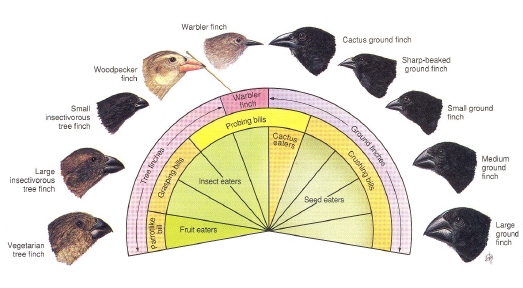
- Convergent evolution
- Be able to describe, recognize, and understand the effects on variation of directional, stabilizing, and diversifying selection.
- Understand how frequency distributions of survivorship translate to fitness functions. Understand what is happening with stabilizing selection in goldenrods and galling flies.
- Understand what aposematic coloration is and how it leads to prey avoidance by predators. Understand how it is involved in mimicry complexes. Be prepared to contrast negative frequency-dependent selection with positive frequency-dependent selection and how these relate to Batesian and Müllerian mimicry. Understand the case studies.
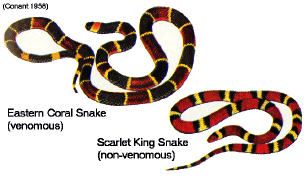
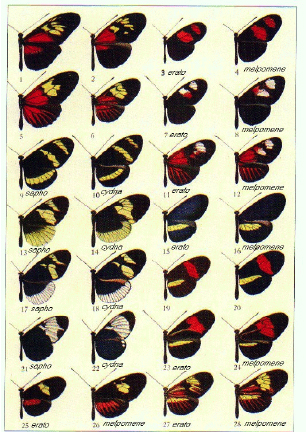
- Points to stress and misconceptions about Natural Selection:
- Natural Selection is an incredibly powerful ordering force, but it is low on innovation.
- Natural Selection is constrained by both available variation and by Natural Selection in the past.
- Natural Selection is not predictive.
- The object of Natural Selection is the individual. Understand how "good-of-the-species" concepts are not stable because of this.
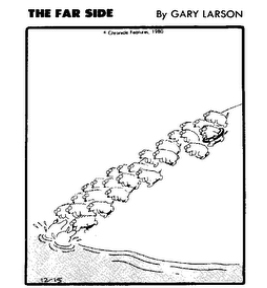
- Natural Selection acts on the whole organism, not individual traits.
- Natural Selection does not necessarily explain every feature seen in organisms.
- Applications of Natural Selection. Understand the concepts underlying the following case studies:
- Size-selective natural resource extraction industries like fishing
- The evolution of antibiotic resistance
- recognize why issues such as complacency, societal factors, technological advances, and economics all created the conditions for antibiotic resistance to spread through inappropriate application of antibiotics.
- recognize why Natural Selection is so effective in bacteria (large population size, large heritable variation, dose-dependent mortality linked to heritable variation.
- recognize why partial treatment is the selective agent for antibiotic resistance.
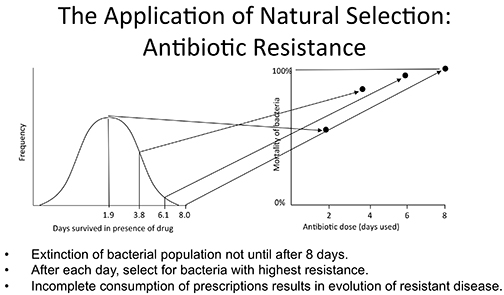
- Lactose intolerance
Characterizing Variation
- Be able to characterize aspects of central tendency: the mean, median, and mode.
- Be able to characterize aspects of dispersion: range, standard deviation (you do not need to calculate the standard deviation)
- Be able to create a histogram and understand distributions: normal, skewed, uniform, multimodal
TERMS TO KNOW
- Genome
- Chromosomes
- DNA (Deoxyribonucleic acid)
- Transcription
- Translation
- Deleterious mutations
- Advantageous mutations
- Nonsynonymous mutations
- Neutral, silent, or synonymous mutations
- Mutations: substitutions, deletions, duplications, inversions, insertions
- Population
- Gene pool
- Allele frequency & fixed alleles.
- Genetic Drift
- Bottleneck effect
- Inbreeding
- Migration
- Assortative mating
- Disassortative mating
- Fitness
- Adaptation
- Directional selection, stabilizing selection, diversifying selection
- Aposematic coloration
- Negative frequency-dependent selection and Batesian mimicry
- Positive frequency-dependent selection and Müllerian mimicry
- Central tendency: mean, median, mode
- Dispersion: range, standard deviation
- Distributions: normal, skewed, uniform, multimodal
FINAL EXAM MATERIAL BEGINS HERE
The final exam will have two parts: a third midterm and a cumulative portion. The third midterm will be similar in format to the previous two midterms and will cover only material since the previous midterm. It is also worth the same amount as the previous midterms. The cumulative portion will be taken word-for-word from either (1) your first two midterm exams, and (2) your three problem sets.
The midterm portion will cover the following modules in their entirety:
Ecology & Evolution, Behavioral Ecology, and Speciation
Ecology & Evolution
- Be able to contrast the environment's two components and understand what they mean: abiotic & biotic.
- Understand what abiotic features are and how they can impact both broadscale patterns of distribution and microhabitat patterns of distribution.
- Be able to define and contrast interspecific and intraspecific interactions.
- Understand the definition of a population, how this is often rather subjective, and how this can be defined and various spatial scales.
Demography & Populations
- Understand how to determine population growth rates by knowing a schedule of births and a schedule of deaths. Understand that the difference between these rates is the intrinsic growth rate (r):
- rN = bN - dN
- With an understanding of birth rates and death rates as a function of age class, one can understand the net reproductive rate for a population.
 where lx = the survival rate for an age class, mx is the fecundity (number of offspring produced) for an age class, and R0 is the net reproductive rate.
where lx = the survival rate for an age class, mx is the fecundity (number of offspring produced) for an age class, and R0 is the net reproductive rate. - You should be able to calculate this from a VERY simple survival & birth table.
- Understand that natural selection could act on survivorship & birth rate to produce different life histories.
- Know that natural selection acts to maximize reproductive output. That is, individuals carrying an allele that confers an increase in R0 will have a selective advantage (e.g. higher fitness).
- Ideal life history: live as long as possible, start to reproduce at an early age, reproduce frequently, produce a large number of offspring with a high rate of survival.
- Understand trade-offs and why organisms cannot simultaneously maximize all of these.
- You do not need to calculate how R0 is converted into a rate of population increase r, but you should know what it means to have a positive r, a negative r, or an r = 0. AND you should know how this plays into our modeling of population growth in an ideal population.
- The driver for understanding the mechanisms for population growth come from Darwin's observation that all populations have the potential to grow exponentially, but they do not because there is competition for resources. The former brings us the model for exponential growth, the latter brings us the model for logistic growth.
- In exponential growth, the rate of population change (dN/dt) = Nr (the population size scaled by the instantaneous rate of increase that can be calculated from life history tables.
- This has an exact solution: Nt = N0 ert. This is a predictive equation that allows us to estimate the population size at some time (t) in the future (Nt) if we know the starting population size (N0), and the intrinsic growth rate (r).
- You should recognize that if r > 0, the population grows exponentially; if r < 0, the population collapses to extinction; if r = 0 then the population is stable.
- You should be able to manipulate this equation to solve for any of the variables. You should be able to calculate doubling, tripling, quadrupling (etc.) times.
- You should understand that the exponential model has a MAJOR limiting assumption: birth & death rates are independent of population size. But you should also know how it can still be applied.
- The logistic growth model makes the intrinsic rate of growth dependent on population size: the larger the population gets, the smaller the growth rate gets until the birth/death rates is balanced by the available resources in the environment, the carrying capacity. A contrast of the r vs N demonstrates the main difference between the models:
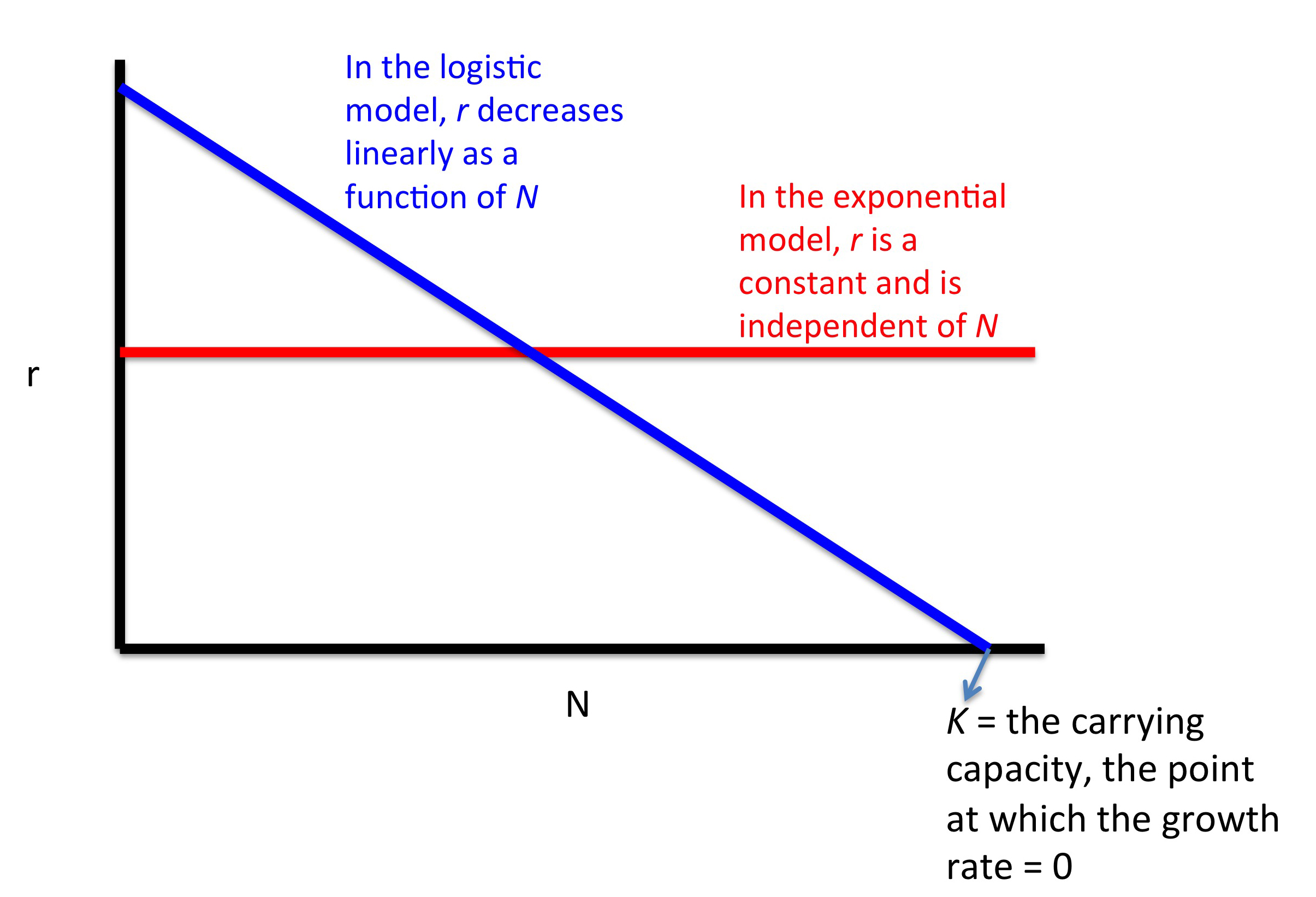
- The logistic model:
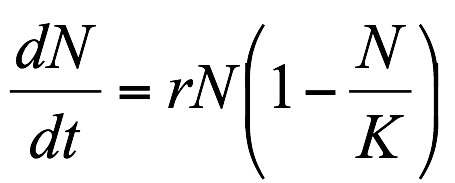 ; note that at very, very small population sizes, this is very similar to the model for exponential growth because N/K is close to zero; but as the population approaches the carrying capacity, the population growth rate gets smaller and smaller due to limiting resources.
; note that at very, very small population sizes, this is very similar to the model for exponential growth because N/K is close to zero; but as the population approaches the carrying capacity, the population growth rate gets smaller and smaller due to limiting resources. - Be able to recognize the logistic growth curve and what it means.
- Note that the carrying capacity is an application of the concept of competition.
Competition and Character Displacement (-/- interaction)
- Understand the different kinds of competition included in the TERMS TO KNOW section below.
- Understand the niche concept and how it is used in understanding aspects of competition, competitive exclusion, limiting similarity, and character displacement.
- Be able to contrast the fundamental niche with the realized niche.
- Understand how niche overlap relates to competition.
- Understand Gause's Principle of competitive exclusion and how this relates to limiting similarity. Be able to apply this to real situations (e.g. an understanding of MacArthur's study of Cape May warblers).
- Understand the process of resource partitioning and how this can result in character displacement. If competition for resources among different species limits population growth, then there should be selection to decrease competition. This stabilizes interaction and increases the likelihood of coexistence.
- Understand evidence for character displacement.
Exploitation (+/- interaction)
- Understand different types of exploitation and how this relates to the numbers of individuals attacked and the lethality of the interaction.
- Why does predation matter?
- Understand how predation can regulate population sizes and how predator/prey interactions can result in cyclical correlations in population size.
- Understand the concept of keystone predators and their impact on community structure.
- Understand that exploitation can lead to important adaptations to either be a better predator or to escape predation.
Note that we did not discuss mutualisms!
BEHAVIORAL ECOLOGY
Sexual Selection
- Compare and contrast intrasexual and intersexual selection.
- Recognize why sexual selection occurs: choosy females (why?) & unselective, competitive males (why?)
- Understand why intrasexual selection results in evolution of armature and why this is so common in resource defense polygyny.
- Understand the idea of intersexual selection and the different models proposed to explain exaggerated male traits.
- Sensory bias hypothesis: what are the predictions and what kind of evidence is used for this?
- Runaway natural selection/sexy son hypothesis: Understand the positive feedback loop via genetic correlations between female preference and male performance.
- Good genes hypotheses. Male trait is an honest indicator of male quality
- Direct benefits hypothesis
- Good genes hypothesis: understand how "fluctuating asymmetry" is involved in this.
- Handicap hypothesis: understand how extreme ornamentation may be an honest indication of ability to gather resources.
Sociobiology & the Evolution of Altruism
- Understand what altruism refers to in the context of sociobiology.
- Understand Hamilton's idea of kin selection and why relatedness (r) is important. NOTE THAT THIS IS NOT THE SAME RELATEDNESS AS DISCUSSED WHEN TALKING ABOUT LIFE HISTORIES.
- Be able to calculate relatedness! Review your notes and your problem set.
- Understand why this is particularly important in eusociality in ants, bees, and wasps. You should be able to calculate relatedness in this haplo-diploid situation.
- Understand the concept of inclusive fitness and how this might explain aid directed toward relatives. Know Hamilton's rule rB - C > 0 and how you might apply it. Review your notes and your problem set.
- Understand how this relates to vertebrate kin selection.
- Understand Trivers' idea of Reciprocal Altruism and how it can explain altruism between non-relatives within a Darwinian context.
- Understand the requirements for the model to work and how the problem of a lack of reciprocation is dealt with:
- Punishment of cheaters
- Strong likelihood of repeated interactions
- Understand the kinds of animals that can exhibit this conditions:
- Animals with a good memory, long life span, low dispersal rate.
- Understand the graph of why this works in vampire bats.
- Understand the requirements for the model to work and how the problem of a lack of reciprocation is dealt with:
SPECIATION
- Understand how we can understand speciation within the context of the 5 processes that cause evolution.
- Be able to contrast anagenesis and cladogenesis.
Species concepts
- Understand what the morphological species concept is, how it is applied, and how it harkens to essentialism.
- Be able to define the Biological Species Concept
- Understand what reproductive isolation is, what reproductive isolating mechanisms are, and how they relate to prezygotic and postzygotic barriers to gene flow.
- Prezygotic barriers prevent a sperm from fertilizing an egg, and they can be broken down into pre-mating and post-mating. Essentially, we start from the least likely to come into contact to the most likely:
- Pre-mating:
- Habitat isolation
- Behavioral isolation
- Temporal isolation
- Post-mating:
- Mechanical isolation
- Gametic isolation
- Pre-mating:
- Postzygotic barriers prevent gene flow by eliminating the effectiveness of reproduction between two individuals after sperm has fertilized an egg:
- Reduced hybrid viability
- Reduced hybrid fertility
- Hybrid breakdown
- Understand how all of these can result in reinforcement.
- Prezygotic barriers prevent a sperm from fertilizing an egg, and they can be broken down into pre-mating and post-mating. Essentially, we start from the least likely to come into contact to the most likely:
Speciation
- Understand the basic elements of speciation. Step 1: a barrier to gene flow is present; Step 2: genetic differentiation occurs; Step 3: reproductive isolation evolves resulting in speciation.
- Understand the main components to each of these steps, but especially the first step, as this is how speciation generally needs to be initiated. It is easy to conceptualize in allopatric speciation, but more difficult in sympatric speciation.
- Allopatric speciation: geographic isolation via dispersal or vicariance.
- Understand how dispersal relates to peripheral isolates allopatric speciation (or peripatric speciation), and the differentiating processes that are important here. Understand how this can create a 'species pump' through founder events. Familiarize yourself with both the example of the Galapagos Finches and the conceptual model. Understand how this can work with the process of character displacement via resource partitioning to result in adaptive radiations.
- Understand the importance of vicariance in speciation.
- Recognize that barriers to gene flow depend on the organisms involved.
- Sympatric speciation.
- Understand how barriers to gene flow are difficult to conceptualize here.
- Generally considered to be due to Natural Selection (remember the stick insect example) or Assortative Mating (remember the cichlid example).
- Hybrid zones.
- Because speciation is a temporally prolonged process from initiation of barriers to gene flow to full reproductive isolation, hybrids can form.
- The results from this can vary from reinforcement (selection against hybrids), to stable hybrid zones (species maintained by different environments), or fusion of the entities back into a single species.
SCIENTIFIC LITERATURE
- Know the general format of a scientific paper:
- Citation (Title, Authors, Institutions, Journal, Volume, Pages)
- Abstract
- Introduction
- Methods
- Results
- Discussion
- Literature Cited
- Acknowledgments
HYPOTHESIS TESTING
- Have a general sense of what Student's t-test is. It allows you to compare whether two samples are likely to have come from the same distribution (not statistically significantly different) or from a different distribution (statistically significantly different).
- Really, really, really know how to interpret a p-value. The p-value is the probability that you are wrong if you say two samples are different. So, if you are willing to be wrong 5% of the time then p < 0.05 means that you have statisticaly significantly different samples.
TERMS TO KNOW
- Ecology
- Abiotic
- Biotic
- Interspecific vs intraspecific
- Population
- Exploitation competition
- Interference competition
- Direct competition
- Indirect competition
- Intraspecific competition
- Interspecific competition
- Niche
- Sympatry
- Allopatry
- Competitive exclusion
- Limiting similarity
- Resource partitioning
- Character displacement
- Exploitation
- Grazers
- Predators
- Parasites
- Parasitoids
- Intersexual selection
- Intrasexual selection
- Anisogamy
- Resource defense polygyny
- Fluctuating asymmetry
- Altruism
- Eusociality
- Haplo-diploidy
- Inclusive fitness
- Indirect fitness
- Direct fitness
- Reciprocal altruism
- Anagenesis
- Cladogenesis
- Prezygotic barriers
- Postzygotic barriers
- Allopatric speciation
- Sympatric speciation
- Dispersal
- Vicariance
- Reinforcement